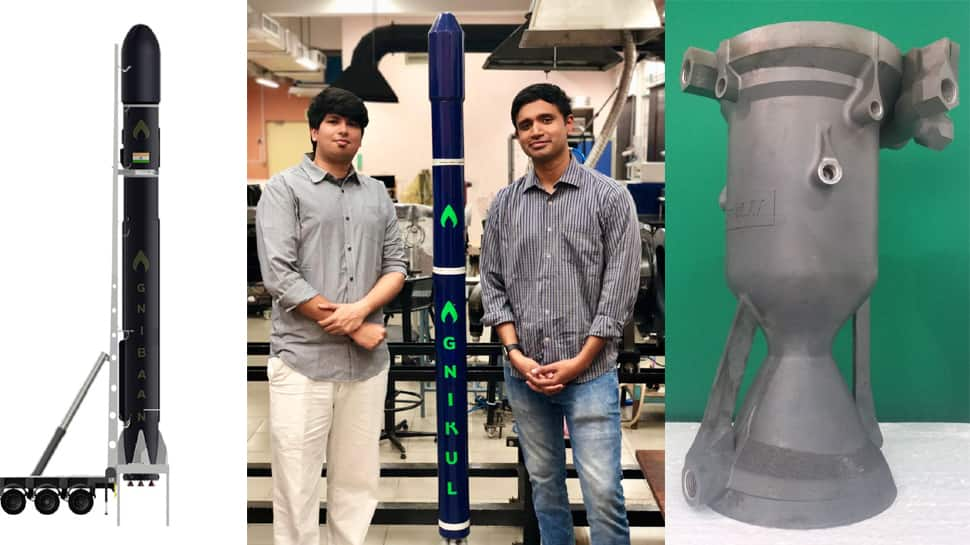


IIT Madras-incubated start-up, Agnikul Cosmos, successfully launched the world's first rocket with a single-piece 3D printed engine, Agnilet, from Sriharikota, becoming the second private company in India to achieve this feat. The rocket, named Agnibaan, is designed to carry a payload of up to 300 kg to a 700 km orbit. The engine was developed entirely in-house using 3D printing technology, making it cost-effective and simpler to handle compared to traditional engines. This accomplishment marks a major milestone in India's space industry, as the Agnilet engine is the world's first semi-cryogenic rocket engine that uses sub-cooled liquid oxygen and regular fuel. This launch is a significant achievement for the Chennai-based start-up, which faced multiple failed attempts before their successful sub-orbital test flight at 7:15 am on Thursday. The launch was conducted with minimal presence of dignitaries at ISRO's Satish Dhawan Space Centre, without any live streaming.
3D Printing Revolutionizes Indian Aerospace with Agnikul Cosmos' Historic Rocket Launch
India's space industry took a bold leap forward with the successful launch of the Agnibaan rocket, powered by the world's first rocket engine manufactured entirely through 3D printing. This historic achievement marks a significant milestone in the country's space exploration endeavors.
Background: India's Space Program
India has a rich history in space exploration, with the Indian Space Research Organization (ISRO) being a pioneer in the field. ISRO's ambitious missions include the development of advanced rockets, satellites, and space probes, and it has successfully launched numerous satellites and spacecraft over the decades.
Agnikul Cosmos: Incubated Innovation
Agnikul Cosmos is a Chennai-based start-up incubated by IIT Madras. Founded in 2017, the company aims to develop affordable and reliable space launch vehicles using 3D printing technology.
3D Printed Rocket Engine: A Game-Changer
The Agnilet engine is a semi-cryogenic rocket engine that uses sub-cooled liquid oxygen and regular fuel. Unlike traditional engines, it is crafted entirely using 3D printing, resulting in significant cost savings and streamlined manufacturing. This innovative approach allows for faster production, easier assembly, and reduced maintenance.
Agnibaan Launch: A Major Milestone
The Agnibaan rocket, equipped with the Agnilet engine, embarked on its sub-orbital test flight on July 18, 2023, from Sriharikota. The launch was a resounding success, with the rocket successfully reaching its target altitude of 700 km.
Top 5 FAQs and Answers
1. What are the advantages of 3D printing in rocket engine manufacturing?
2. Why is the Agnilet engine significant?
3. What are the future plans for Agnikul Cosmos?
4. How does this achievement impact India's space industry?
5. What does the future hold for 3D printing in aerospace?
The success of Agnikul Cosmos' Agnilet engine and the Agnibaan launch is a testament to the innovation and determination driving India's space program. The adoption of 3D printing technology is expected to revolutionize the aerospace industry, paving the way for more ambitious and cost-effective space missions in the future.

Union Railway Minister Ashwini Vaishnav, at the International Railway Equipment Exhibition (IREE), highlighted India's remarkable progress in railway modernisation, stating that under the leadership of Prime Minister Narendra Modi, the country has witnessed the construction of 35,000 kilometres of new railway tracks and electrification of 46,000 kilometres of tracks in the past 11 years. He praised the Confederation of Indian Industry (CII) for organising the IREE and urged them to think bigger and envision a global-scale railway exhibition that surpasses Germany's InnoTrans, showcasing India's growing capabilities in railway infrastructure and technology.

On Friday, the IRCTC website and mobile app faced technical issues, causing an outage and inconvenience to over 5,800 users trying to book tickets. Social media platforms were flooded with complaints as the server crashed during peak booking hours, with some suggesting the need for better technology to handle festive rush. Officials have assured that efforts are being made to restore normal operations.

In a boost for the festive season, Indian Railways has launched two special Vande Bharat trains between Delhi and Patna. These trains will run till November 17 and offer a luxurious and secure travel experience for passengers during Diwali and Chhath Puja. With stops at six important stations, these trains will cover a distance of 1,000 km in under 14 hours.

As India prepares for Dhanteras 2025, gold has already become the star of the show, with prices surging more than 50% this year and showing no signs of slowing. The combination of global and domestic factors, including safe-haven demand, central bank buying, and economic uncertainty, has pushed gold to an all-time high of over Rs 1,30,000 per 10 grams. As investors flock to add the precious metal to their portfolio, experts predict a continued upward trend, driven by lower interest rates, de-dollarisation, and geopolitical tensions.

India’s economy and markets are seeing a resurgence, with PE and VC investments soaring to a three-year high of $26 billion in 2025. The country’s growing affluence and digital transformation have spurred a luxury market boom, with high-end brands rushing in to meet the demand. The trend is supported by a shift towards larger, more strategic investments in sectors such as IT and consumer staples.

MCX December gold futures on the Multi Commodity Exchange (MCX) skyrocketed by 1.4%, reaching an all-time high of ₹1,32,770 per 10 grams. Meanwhile, silver prices dropped slightly on the MCX to ₹1,85,000 per kilogram. The surge in gold prices can be attributed to a weaker US dollar, strong spot demand, and positive global cues, making gold an attractive investment option. However, the rising prices may have an impact on shoppers this Diwali, as the cost for 10 grams of 24-carat gold has surpassed ₹1.3 lakh. Despite this, jewellers remain optimistic, as increased household liquidity and positive economic indicators continue to encourage discretionary spending.

The well-known fitness club chain, Planet Fitness, has recently opened a new location in Monument, Colorado. Located at 16096 Jackson Creek Parkway, the club will hold its official grand opening on Saturday with a celebratory event at 10 a.m. This new location promises to offer residents of Monument a state-of-the-art fitness facility and a wide range of amenities.

The CEO of Virgo Specialities Pvt Ltd, Ketan Kadam, has been denied bail for the second time for his alleged involvement in the Mithi river desilting scam. The sessions court noted that Kadam has "direct involvement" in the crime, having "managed money received from contractors in his shell companies." According to the Economic Offences Wing (EOW), Kadam and others conspired to defraud the Brihanmumbai Municipal Corporation (BMC) through irregularities in the tendering process. Kadam is accused of manipulating the terms and conditions of the tenders to benefit his company and causing losses to the BMC.

As India's luxury market continues to see a rise in demand, M3M India, one of the biggest real estate developers in Delhi-NCR, has announced the launch of Jacob & Co. Residences in Noida. This will be the first residential development in India under the iconic Jacob & Co. brand, and is expected to generate a topline of ₹3500 crore. The project will feature ultra-luxury serviced residences and limited-edition Jacob & Co. timepieces, elevating the ownership experience to a whole new level. With this venture, M3M aims to bring a truly global lifestyle to homebuyers in Noida and contribute to the nation building vision of Prime Minister Narendra Modi.

Get the latest and most trusted insights on the world of business and finance delivered straight to your inbox by subscribing to our newsletters. Our team of experts curates exclusive content that you can rely on, without any bias or external influence. Stay informed and ahead in the ever-changing world of business with our newsletters.